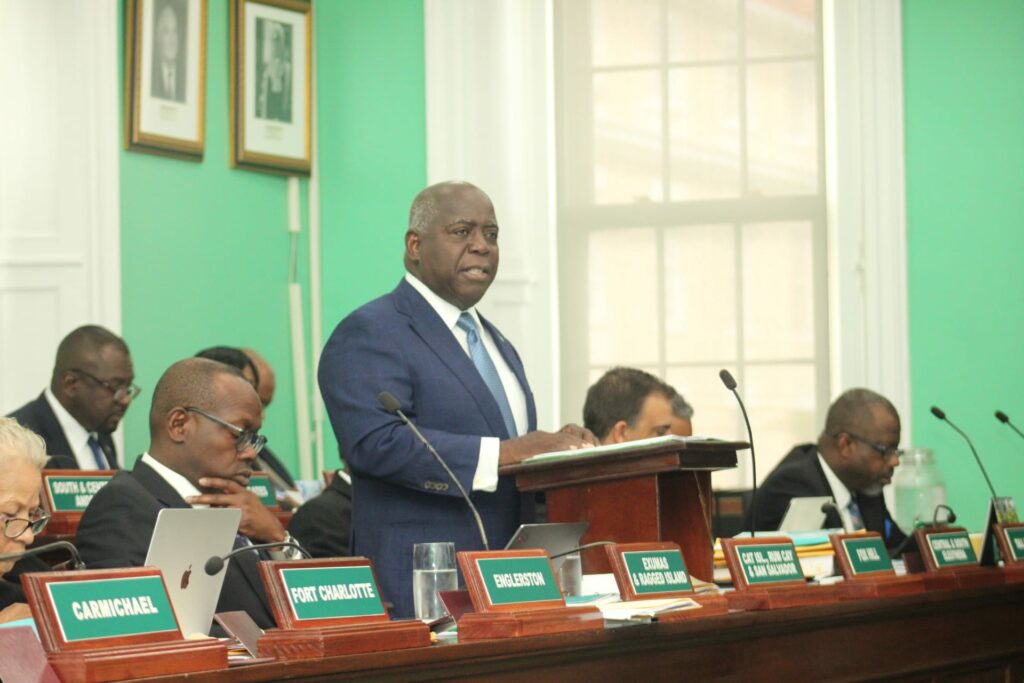JUSTICE DELAYED IS TOO OFTEN JUSTICE DENIED

Madam Speaker:
It is always a privilege to rise in this Honourable House on behalf of my extraordinary constituents, who live and work in the beautiful islands of Cat Island, Rum Cay, and San Salvador.
Today I do so in support of the Trial By Judge Alone (Miscellaneous Provisions) Bill (2024) and the Supreme Court (Amendment) Bill (2024), which introduce two long-awaited and much-needed reforms to our justice system.
We all know that the backlogs and lengthy delays in our criminal justice system contribute to a culture of impunity. Put simply, too many criminals in our country think they can run out the clock — they are willing to take their chances in a justice system they don’t believe will hold them accountable any time soon, if ever.
And unfortunately, long delays do undermine conviction rates. That is true for multiple reasons – let me give you just one: delays make it harder for prosecutors to prove cases that rely on victims and witnesses, as they may be unwilling (or unable) to provide testimony years after a crime was committed, as recollection of events may fade with time.
So we know that all too often, justice delayed results in justice denied.
And we know that if we want criminals to fear the law, the consequences and repercussions of law-breaking must arrive swiftly.
Madam Speaker:
In January, I announced our government’s five pillar approach to crime.
The first pillar is Prevention, which addresses the root causes of crime, by strengthening and supporting families, schools, and communities; providing social services; and expanding educational, training, and employment opportunities.
The second pillar is Policing:
The Minister of National Security and the Commissioner of Police are bringing their formidable expertise and determination to the work of strengthening our police force. Saturation patrols are extending the police presence in many communities; new anti-gang strategies are being implemented to reclaim our neighborhoods; and modern tools and technology, like drones, CCTV, facial recognition software, and other surveillance tools, are helping our officers investigate crimes and apprehend criminals. Our security forces are also strengthening the regional partnerships which help us reduce the drugs and guns coming across our borders.
Prosecution is the third pillar:
We are expanding prosecutorial resources, creating new specialized courts for specific types of crimes, strengthening support for victims and witnesses, and reforming the criminal justice system to bring about swifter legal proceedings — with the two bills before us today falling in this latter category.
Punishment is our Crime Plan’s fourth pillar:
The Bail (Amendment) Act we passed earlier this year gives judges new accountability tools — because when it comes to disincentivizing the violation of bail terms, there’s a big difference between jail time and a slap on the wrist. We have also passed harsher penalties for gang involvement, and we are going to work in our communities to expand public awareness of those penalties, to increase their deterrent effect. We will soon introduce a new Firearms Bill, in order to increase penalties for those in possession of illegal firearms.
Our final pillar, Rehabilitation, refers to preparing offenders for successful reintegration into society, which can include training, and will also soon include transitional and reintegration processes like Parole and Conditional Releases.
Each of the five pillars has additional components, along with the ones I’ve outlined today. Together, the five pillars encompass a comprehensive set of policies to address crime and violence in our country, and build safer and stronger communities.
Madam Speaker:
The Supreme Court (Amendment) Bill before us today makes a single insertion into section 76, paragraph (g) of the Supreme Court Act which states:
“for regulating the active management of civil and criminal matters before the Court.”
This insertion allows for the making of rules to regulate and promote the active management of criminal and civil matters before the Supreme Court.
This is necessary, Madam Speaker, because — to reiterate the point I made at the outset — the speed with which we deliver justice in criminal matters is essential.
Previous reforms led to progress on case backlogs, and today we are taking an important step forward to increase efficiencies in our justice system.
I note, too, that this Bill acknowledges considerable changes are also needed when it comes to the case management of civil matters, where delays have also long plagued our system.
Madam Speaker:
The other Bill before us, the Trial by Judge Alone Bill (2024), allows for trials on indictable offences in which a verdict may be determined by a judge alone.
The Trial by Judge Alone Bill gives the accused an opportunity to waive their constitutional right to a jury trial, in favour of having a judge rule based on findings related to the facts and the relevant law.
There are many reasons a defendant may prefer a bench trial – for example, in matters involving complex or technical facts or law, a defendant may prefer to have matters adjudicated by a judge, rather than a jury of laypeople.
I emphasize that the constitutional right to a trial by jury remains; the defendant is simply gaining the right to choose for himself.
This is a decision that defendants should make with advice of counsel, so that the specific circumstances of each case can be carefully considered.
After weighing various policy considerations, many jurisdictions abroad – for example, jurisdictions within the United States, India, Canada, and the Netherlands — have chosen to provide defendants with the right to choose trial by judge alone, and in the United Kingdom bench trials by judge alone are also not uncommon. Benefits can include impartiality (for example, in cases where jury bias may be a concern) and more efficient, shorter trials, with time-consuming jury selection and deliberations no longer necessary. Judges experienced at evaluating the evidentiary weight of facts, and applying the law, are frequently able to resolve cases expeditiously.
Madam Speaker:
The right to trial by jury is a bedrock constitutional right, one with deep historical roots as a protection for citizens from prosecutorial overreach. Providing citizens with the right to choose a trial by jury remains essential for public trust in a justice system.
Yet juries can be capricious, and unpredictable.
Several months ago, the Council of Legal Education at Eugene Dupuch Law School celebrated their 25th anniversary with a panel discussion featuring the Chief Justice and several of his predecessors, during which they shared insights on a variety of legal issues. I was not able to attend, but I was told that the Chief Justices discussed instances in which jury trials had led to perplexing outcomes, out of step with reasonable expectations.
A defendant might view a jury as vulnerable to bias, prejudice, or emotional appeal, and prefer that a judge evaluate the strength of the evidence in the case. Bench trials can yield more predictable and consistent rulings.
One additional point is relevant here: when a judge makes his or her determination, he or she must use facts, statutes, and case law to explain the basis for that decision.
Juries, on the other hand, are not expected or required to give the rationale for their verdicts, or to explain their decisions in those instances when the verdict may deviate from the anticipated outcome based on the law.
Madam Speaker:
Every Bahamian citizen has a constitutional right to a trial by jury, and after this law is passed, they will continue to have that right.
Today, we introduce an additional right — the right to choose a trial by judge alone.
This is a change that legal scholars and professionals have been requesting for some time. In fact, more than a decade ago, a Constitutional Commission made note of The Bahamas’ rigid approach compared to other jurisdictions, and referenced the need to introduce an option for Trial by Judge Alone.
Madam Speaker:
Today, in passing these reforms, we are taking new steps to promote the swift and fair resolution of cases in our justice system.
The Supreme Court (Amendment) Bill (2024) and the Trial By Judge Alone Bill (2024) have my strong support.
Thank you, and may God bless The Bahamas and all her people with peace, safety, and security.







